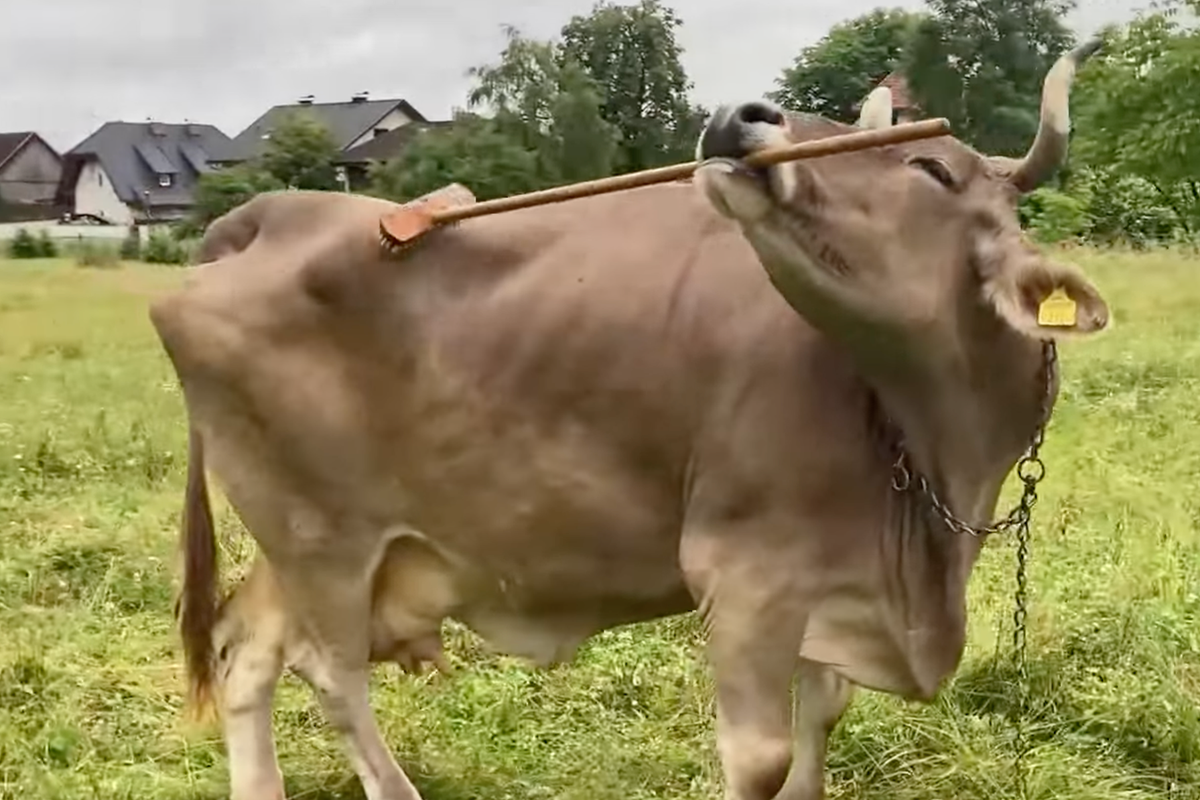An Austrian cow has made scientific history by using a broom to scratch her itches
Cow tools are a real thing now.
Veronika knows how to use a broom for her own purposes.
One of the main traits that separates mankind from animals is our use of tools. However, there are some species that do use or construct a tool to help them accomplish a task. Chimpanzees, ravens, and other animals have been recorded using tools, but a cow was never among them. Until now.
Veronika, a 13-year-old Swiss brown cow living in Austria, has made scientific history by being the first recorded case of a cow using tools. Veronika reportedly picked up sticks and used them to scratch unreachable parts of herself as early as three years old. When researchers went to study Veronika, they gave her a broom to see if she would use it like her trusty sticks. Veronika not only picked up the broom by the handle to use its bristles to scratch her torso, but she would intentionally switch it up to use the smoother handle end to poke at more sensitive areas. This means that Veronika can not only use a tool, but adapt the same tool for another purpose.
- YouTube youtu.be
“It was clear that this was not accidental," said Alice Auersperg, a cognitive biologist at the University of Veterinary Medicine in Vienna (UVM Vienna) to Ars Technica. “This was a meaningful example of tool use.”
"We were not expecting cows to be able to use tools, and we were not expecting a cow to use a tool as a multipurpose tool,” said Dr Antonio Osuna-Mascaro of UVM Vienna to BBC News. “Until now this has only been consistently reported in chimpanzees."
@independent This is Veronika, a 13-year-old brown Swiss cow from the Austrian countryside who has stunned scientists by becoming the first documented cow to use a multi-purpose tool. Experts say Veronika's back scratching may force us to rethink the intelligence of the species. Click the link in bio for more 🔗
While this is the first scientific study of a cow using tools, there have since been other videos popping up online showing other cows demonstrating similar behavior to Veronika’s. Some of the videos included Brahman bulls, a type of cattle that diverged from Veronika’s millions of years ago. This suggests that cows and other bovines using tools isn’t a new feat for them, but rather something that we just didn’t notice or look for until recently.
Both the authors of the study and lay people online remarked that the scientific uncovering reminded them of the infamous Far Side comic strip titled Cow Tools. In the single panel comic, Far Side creator and artist Gary Larson drew a bipedal cow displaying weird objects on a table outside a barn with a simple caption: “Cow tools.” Since its publication in 1982, fans and critics of Larson’s work have debated whether the comic was too confusing or too weird to be funny, or if it was a high concept or plain bizarre comedy work. In spite of it being considered Larson’s most confusing comic, Cow Tools would take on a life of its own as an Internet meme decades after its initial publication.
@stuffyoushouldknowpod The Far Side is one of the greatest cartoons in history. Today we go to great lengths to convince you of that. #sysk #farside #comics #comicstrip #cowtools
Unintentionally, Larson appears to have manifested the concept of cows using tools into our reality, or at least caused UVM Vienna to pay enough attention to actually notice them. It goes to show that there is plenty more to discover about the animals around us. Who knows what else has gone long overlooked?

